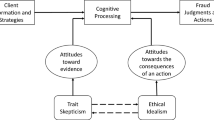Abstract
Prior research has investigated the influence of decision maker characteristics on decision choice. This research examines the effect two personality traits of taxpayers, attitude towards risk and ethical standards, on intentional noncompliance. A taxpayer who is more (less) ethical will have lower (greater) intentional noncompliance, while a taxpayer who is more (less) risk averse will have lower (greater) intentional noncompliance. However, this study also found significant correlation between risk attitudes and ethical standards. This is because tax evasion is not just a gamble which can be explained by merely considering the risk variable. To understand tax evasive behavior better requires incorporation of noneconomic factors in the analysis, such as ethical standards, although risk attitudes may be an important explanatory factor. The current research suggests that individuals with lower ethical standards will have more intentional noncompliance. However, since ethical standards are correlated with attitude toward risk, the Internal Revenue Service (IRS) can partially overcome the influence of ethics by making the tax audit environment more uncertain. Thus, the research results justify the decision of the IRS not to release all its audit parameters because it makes the audit environment less uncertain.
Similar content being viewed by others
References
American Bar Association: 1987,ABA Commission on Taxpayer Compliance Report and Recommendations (American Bar Association, Washington, D.C.).
Baldry, J. C.: 1986, ‘Income Tax Evasion and the Tax Schedule: Some Experimental Results’,Public Finance 42, 357–383.
Becker, S. W.: 1967, ‘Crime and Punishment: An Economic Approach’,Journal of Political Economy 78(2), 526–536.
Belsley, D. A., E. Kuh, and R. E. Welsch: 1980,Regression Diagnostics (John Wiley & Sons, New York, NY).
Bergner, L.: 1972,Use of Power, Machiavellianism and Involvement in a Simulated Industrial Setting (Ph.D. dissertation, Temple University).
Blumstein, A.: 1983, ‘Models for Structuring Taxpayer Compliance’, in P. Sawicki, ed.,Income Tax Compliance: A Report of the ABA Section on Taxation, Invitational Conference on Income Tax Compliance (American Bar Association, Washington, D.C.), pp. 159–172.
Brockhaus, R. H.: 1980, ‘Risk Taking Propensity of Entrepreneurs’,Academy of Management Journal 23(3), 509–520.
Carmella, P.: 1985,Moral Judgement: A Study of Professional Business Managers (Ph.D. dissertation, University of Texas at Austin).
Carroll, J. S.: 1989, ‘A Cognitive-process Analysis of Taxpayer Compliance’, in J. A. Roth and J. T. Scholz, eds.,Taxpayer Compliance, Volume 2: Social Science Perspective (University of Pennsylvania Press, Philadelphia, PA), pp. 229–272.
Christie, R. and F. L. Geis: 1970,Studies in Machiavellianism (Academic Press, New York, NY).
Collins, J. H., V. C. Milliron, and D. R. Toy: 1992, ‘Determinants of Tax Compliance: A Contingency Approach’,The Journal of the American Taxation Association 14(Fall), 1–29.
French, S.: 1986,Decision Theory: An Introduction to Mathematics of Rationality (John Wiley, New York, NY).
Fromkin, H. L. and S. Streufret: 1976, ‘Laboratory Experimentation’, in M. D. Dunnette, ed.,Handbook of Industrial and Organizational Psychology (Rand McNally, Chicago, IL), pp. 415–458.
Geis, F., R. Christie, and C. Nelson: 1970, ‘In Search of the Machiavel’, in R. Christie and F. L. Geis, eds.,Studies in Machiavellianism (Academic Press, New York, NY).
Ghosh, D. and M. R. Ray: 1992, ‘Risk Attitude, Ambiguity Intolerance and Decision Making: An Exploratory Investigation’,Decision Sciences 23(2), 431–444.
Hogarth, R.: 1987,Judgement and Choice (John Wiley & Sons, New York, NY).
Jackson, B. R. and V. C. Milliron: 1986, ‘Tax Compliance Research: Findings, Problems, and Prospects’,Journal of Accounting Literature 5, 125–165.
Jackson, D.: 1976,Jackson Personality Inventory Manual (Research Psychology Press).
Klepper, S. and D. Nagin: 1989, ‘The Criminal Deterrence Literature: Implications for Research on Tax Compliance’, in J. A. Roth and J. T. Scholz eds.,Taxpayer Compliance, Volume 2: Social Science Perspective (University of Pennsylvania Press, Philadelphia, PA).
Kogan, N. and M. Wallach: 1964,Risk-taking: A study in Cognition and Personality (Holt, Rinehart and Winston, New York, NY).
Kohlberg, L.: 1984,The Psychology of Model Development (Harper & Row, San Francisco, CA).
Lindzey, G and E. Aronson: 1968,The Handbook of Social Psychology (Addison-Wesley, MA).
Long, D. K.: 1976, ‘An Experimental Investigation of Selected Communication Effects of Machiavellianism’,Speech Communication Association Convention.
McLaughlin, B.: 1970, ‘Incidental Learning and Machiavellianism’,Journal of Social Psychology 82, 109–115.
Nutt, P. C.: 1986, ‘Evaluating MIS Design Principles’,MIS Quarterly 10(2), 139–155.
Orne, M.: 1969, ‘On the Psychology of the Psychological Experiment’,American Psychologist 24, 776–783.
Schoemaker, P. J. H.: 1990, ‘Are Risk-attitudes Related Across Domains and Response Modes?’,Management Science 36, 1451–1463.
Song, Y. and T. Yarbrough: 1978, ‘Tax Ethics and Taxpayer Attitudes: A Survey’,Public Administration Review (September–October), 442–452.
Spicer, M.: 1986, ‘Civilization at a Discount: The Problem of Tax Evasion’,National Tax Journal (March), 13–20.
Taylor, R. N. and M. D. Dunnette: 1974, ‘Relative Contribution of Decision-Maker Attributes to Decision Processes’,Organizational Behavior and Human Performance 12, 286–298.
Trevino, L.: 1986, ‘Ethical Decision Making in Organizations: A Person-situation Interactionist’,Academy of Management Review, pp. 601–617.
Trevino, L. and S. Youngblood: 1990, ‘Bad Apples in Bad Barrels: A Causal Analysis of Ethical Decision-making Behavior’,Journal of Applied Psychology, pp. 378–385.
Umanath, N. S., M. R. Ray, and T. L. Campbell: 1993, ‘The Impact of Perceived Environmental Uncertainty and Perceived Environmental Agent Effectiveness on the Composition of Compensation Contracts’,Management Science,39(1), 32–45.
Wiggins, N., P. J. Hoffman, and T. Taber: 1969, ‘Types of Judges and Cue Utilization Judgements of Intelligence’,Journal of Personality and Social Psychology 12, 52–59.
Author information
Authors and Affiliations
Additional information
Dipankar Ghosh's research interests are in judgment and decision making, transfer pricing, and negotiation. He has published inDecision Science, Journal of Conflict Management, International Journal of Accounting, andJournal of Management Accounting Research.
Terry L. Crain's research interests are in tax policy, tax equity, and the effects of taxation on taxpayer decision. He has published inDecision Science, International Journal of Accounting, andJournal of the American Taxation Association.
Rights and permissions
About this article
Cite this article
Ghosh, D., Crain, T.L. Ethical standards, attitudes toward risk, and intentional noncompliance: An experimental investigation. J Bus Ethics 14, 353–365 (1995). https://doi.org/10.1007/BF00872098
Issue Date:
DOI: https://doi.org/10.1007/BF00872098




